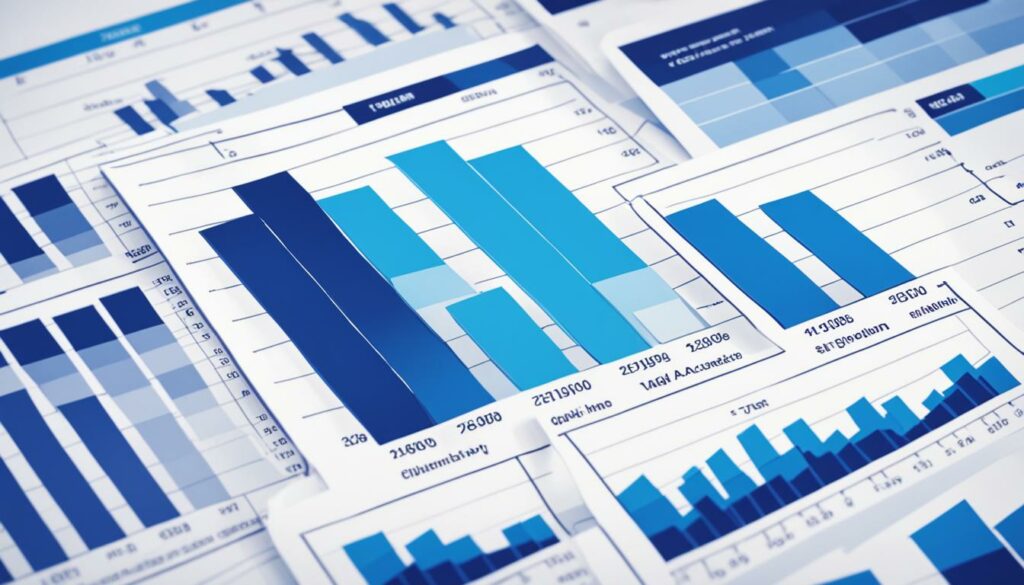Accruals are a crucial aspect of ecommerce accounting that play a vital role in ensuring accurate financial reporting and the overall fiscal health of a business. Accrual accounting is one of the two most common bookkeeping methods used in ecommerce, with the other being cash accounting.
In this article, I will explore what accruals are, how they work, and why they are favored in the ecommerce industry. Additionally, I will discuss strategies to improve accrual accounting, the impact of customer behavior on accruals, and the relationship between accruals and other key metrics. We will also address any challenges and considerations that ecommerce businesses face when it comes to accruals.
Key Takeaways:
- Accruals are an essential part of ecommerce accounting, ensuring accurate financial reporting.
- Accrual accounting is widely used in ecommerce due to its ability to provide a more accurate picture of revenue and expenses.
- Accrual accounting allows businesses to recognize revenue when a sale occurs, even if the payment has not been received.
- Improving accrual accounting in ecommerce can be achieved through effective data organization, accurate record-keeping, and the use of accounting software.
- Ecommerce businesses face challenges such as managing cash flow and tax liability when implementing accrual accounting.
An Overview of Accounting and Why It Matters
Accounting is a fundamental aspect of running a business as it involves summarizing, analyzing, and reporting on the financial transactions that occur within the company. Through proper accounting practices, businesses gain valuable insights into their costs and revenue, assess their performance and overall fiscal health, and ensure compliance with legal obligations.
Bookkeeping is an essential component of accounting, as it involves recording and organizing financial transactions accurately. This process lays the foundation for generating financial reports and provides a clear picture of a business’s financial position.
Financial transactions encompass various activities and events, including sales, purchases, expenses, and payments. Each transaction must be properly recorded to ensure accurate financial reporting and decision-making.
Financial reporting is a critical output of the accounting process. It involves preparing and presenting financial statements that provide a comprehensive view of a business’s financial performance and position. These statements include balance sheets, income statements, and cash flow statements.
One of the main reasons why accounting matters for businesses is that it helps assess their overall fiscal health. By analyzing various financial metrics and ratios, such as profitability, liquidity, and solvency, businesses can evaluate their performance and identify areas for improvement.
Moreover, accounting plays a crucial role in compliance with legal and regulatory requirements. Accurate financial reporting ensures transparency and accountability, enabling businesses to meet their tax obligations and fulfill statutory reporting obligations.
Effective accounting practices also provide a system for tracking assets and liabilities. Businesses need to monitor their assets, such as inventory and property, and liabilities, including loans and accounts payable, to make informed financial decisions.
Table: Key Components of Accounting
| Component | Description |
|---|---|
| Bookkeeping | Recording and organizing financial transactions |
| Financial Reporting | Preparing and presenting financial statements |
| Financial Analysis | Assessing financial metrics and ratios |
| Compliance | Fulfilling legal and regulatory obligations |
| Asset and Liability Tracking | Monitoring assets and liabilities |
Without proper accounting practices, businesses may face challenges in managing their finances, making informed decisions, and ensuring long-term success. By prioritizing accounting and implementing sound financial practices, businesses can lay a solid foundation for their operations and promote sustainable growth.

How Accounting Works Today
Accounting today relies on various financial statements to provide a clear picture of a business’s financial activity. These statements include cash flow statements, income statements (also known as profit and loss statements), and balance sheets. Together, they help track the movement of money into and out of the company and provide valuable insights into its financial health.
Cash flow statements provide a detailed breakdown of a business’s cash inflows and outflows over a specified period. This statement helps identify where the cash is coming from and where it is being allocated, giving businesses a better understanding of their liquidity and ability to meet financial obligations.
Income statements, on the other hand, summarize a business’s revenues, expenses, and net income (or loss) for a specific period. They serve as a valuable tool for assessing profitability and operational performance. By analyzing income statements, businesses can identify areas of strength or weakness and make informed decisions to improve financial outcomes.
Balance sheets provide a snapshot of a business’s financial position at a given point in time. They present the company’s assets, liabilities, and equity, allowing businesses to understand their financial standing and assess their ability to meet long-term obligations. Balance sheets are crucial for evaluating solvency, liquidity, and overall financial stability.
To ensure accurate recording of financial transactions, businesses rely on double-entry bookkeeping. Under this method, every transaction is recorded with both a debit and a credit entry, ensuring that the books remain balanced. Double-entry bookkeeping is essential for accurate financial reporting and serves as the foundation for effective financial management.

Cash and Accrual Accounting Basics
In the world of business bookkeeping, there are two primary methods used to track income and expenses: cash accounting and accrual accounting. Each method offers its own advantages and considerations. Let’s take a closer look at how cash accounting and accrual accounting work, and how they impact revenue recognition and expense recognition.
Cash Accounting:
Cash accounting is a straightforward and real-time approach to financial record-keeping. With this method, income and expenses are recorded when money is received or paid. In other words, transactions are recorded based on actual cash flow.
Cash accounting is commonly utilized by small service-based businesses that don’t typically deal with credit sales or inventory. This method provides a clear and immediate view of cash flow, making it easier to manage day-to-day expenses and monitor available funds.
Accrual Accounting:
Accrual accounting, on the other hand, takes a more comprehensive and long-term perspective. This method records income and expenses when they are earned or incurred, regardless of when the actual cash exchange takes place.
Accrual accounting is particularly beneficial for ecommerce businesses that often engage in credit sales or deal with inventory and associated costs. By recognizing revenue and expenses as they are earned or incurred, accrual accounting provides a more accurate picture of a business’s financial position.
Table: Cash Accounting vs. Accrual Accounting
| Cash Accounting | Accrual Accounting |
|---|---|
| Records transactions based on cash flow | Records transactions based on when they are earned or incurred |
| Ideal for small service-based businesses | Ideal for ecommerce businesses dealing with credit sales and inventory |
| Provides a real-time view of available cash | Offers a more accurate picture of revenue and expenses |
While cash accounting provides simplicity and immediacy, accrual accounting offers a more comprehensive view of revenue and expenses. It helps businesses better understand their financial position and make informed decisions based on actual earnings and costs, rather than just cash flow.

Reporting Sales with Accrual Accounting
Accrual accounting is a powerful tool that enables businesses to have a comprehensive view of their financial health. By recognizing revenue when a sale occurs, regardless of payment receipt, accrual accounting provides a more accurate representation of a business’s financial position. This method includes both cash and credit sales in the financial reports, giving a clearer picture of the revenue streams and aiding in cash flow management.
For ecommerce businesses, where sales often involve credit transactions, accrual accounting is particularly beneficial. It allows businesses to track and report revenue on both cash and credit sales, providing a more reliable indicator of their financial position. This is essential for understanding the true financial health of the business and making informed decisions.
By utilizing accrual accounting, businesses gain insights into the overall revenue generated, contributing to a better understanding of the company’s financial performance. This is especially valuable for ecommerce businesses, as it helps monitor cash flow and facilitates effective financial management.
In order to illustrate the importance of accrual accounting in the ecommerce industry, consider the following example scenario:
An ecommerce company sells a product on credit to a customer. According to the accrual accounting method, the sale is recognized as revenue at the time of the transaction, even if the payment is not received immediately. This allows the business to have an accurate representation of its revenue streams and financial performance, regardless of the timing of cash inflows.
Accrual accounting also aids in managing cash flow effectively. By including all sales in the financial reports, businesses can better assess their financial position and plan for future expenses and investments. This ensures that the company remains financially stable and can meet its obligations.
Overall, reporting sales with accrual accounting provides ecommerce businesses with a more holistic view of their financial health. It enables accurate revenue recognition, facilitates cash flow management, and ensures businesses have the necessary information to make informed decisions for sustainable growth.
Snapshot of Sales Recognition with Accrual Accounting
| Month | Total Sales | Cash Sales | Credit Sales |
|---|---|---|---|
| January | $10,000 | $6,000 | $4,000 |
| February | $12,000 | $7,000 | $5,000 |
| March | $15,000 | $8,000 | $7,000 |
As shown in the table above, accrual accounting allows businesses to track both cash and credit sales, providing a complete picture of their revenue streams. This helps in understanding the financial health of the business and assists in making data-driven decisions related to cash flow management.

Accrual Accounting in Ecommerce
Accrual accounting plays a vital role in the financial management of ecommerce businesses. It offers numerous benefits, including accurate financial analysis, improved planning, and a deeper understanding of revenue streams. By adopting accrual accounting, ecommerce businesses can make informed decisions and create future forecasts based on reliable data.
One of the key advantages of accrual accounting is its ability to spread out the costs of purchasing inventory. Instead of recording expenses only when cash is exchanged, accrual accounting recognizes expenses when they are incurred, providing a more accurate representation of the business’s profitability. This allows ecommerce businesses to gain insights into the true costs associated with their products and make more informed pricing decisions.
Accrual accounting also provides a better understanding of revenue streams. By recognizing revenue when a sale occurs, even if the payment has not been received, accrual accounting captures the full scope of the business’s sales activity. This is particularly important for ecommerce businesses that often rely on credit sales or preorders, as it allows them to track and manage revenue more effectively.
Furthermore, accrual accounting enhances cash flow management. By accurately reflecting revenue and expenses in the financial statements, businesses can gain a clearer picture of their cash position and plan accordingly. This is crucial for ecommerce businesses that need to carefully manage cash flow to ensure the smooth operation of their operations and avoid cash flow shortages.
While accrual accounting may require more skill and the assistance of an accountant, the benefits it brings to ecommerce businesses make it well worth the investment. Accurate financial analysis, improved planning, a better understanding of revenue streams, and effective cash flow management all contribute to the long-term profitability and success of an ecommerce business.
Key Benefits of Accrual Accounting in Ecommerce:
- Accurate financial analysis
- Improved planning and forecasting
- Better understanding of revenue streams
- Enhanced cash flow management
Strategies to Improve Accrual Accounting in Ecommerce
Accrual accounting plays a crucial role in maintaining accurate financial records for ecommerce businesses. To enhance accrual accounting practices and ensure reliable data for financial management, there are several strategies that businesses can implement. These strategies focus on effective data organization, accurate record-keeping, and the utilization of accounting software.
- Organize Data Effectively: Proper data organization is essential for efficient accrual accounting. By categorizing sales and expenses, creating clear labels for transactions, and setting up a systematic filing system, businesses can easily track and analyze financial data. This enables businesses to retrieve information quickly and accurately, facilitating accurate accrual entries.
- Maintain Accurate Records: Accurate record-keeping is fundamental in accrual accounting. Every financial transaction should be documented, including invoices, receipts, and bank statements. By consistently recording transactions and ensuring their accuracy, businesses can create a reliable audit trail and eliminate discrepancies in financial reporting.
- Utilize Accounting Software: Accounting software can greatly streamline accrual accounting processes. Cloud-based accounting programs, such as QuickBooks or Xero, offer automated features for generating financial statements. These software solutions can simplify the accrual accounting process, minimize errors, and provide real-time visibility into the financial health of the business.
Implementing these strategies will improve the accuracy and efficiency of accrual accounting in ecommerce. By organizing data effectively, maintaining accurate records, and utilizing accounting software, businesses can ensure the integrity of their financial data. This, in turn, enables informed decision-making based on reliable and up-to-date information.
Challenges and Considerations of Accrual Accounting in Ecommerce
Accrual accounting is an essential accounting method for ecommerce businesses, but it does come with its own challenges and considerations that need to be taken into account. One of the main challenges is effectively managing cash flow. Unlike cash accounting, accrual accounting may not accurately reflect the actual cash position of the business, as it focuses on recognizing revenue and expenses when they are earned or incurred, regardless of when the cash is exchanged.
To overcome this challenge, businesses should pay close attention to cash flow management. It is crucial to have a solid understanding of cash flow patterns and to ensure that there are enough funds to cover expenses and meet financial obligations. Ecommerce businesses may need the assistance of an accountant to extract cash flow data and make informed decisions based on the cash position of the business.
Another consideration when it comes to accrual accounting in ecommerce is tax liability. Accurate financial records are crucial for determining tax obligations and ensuring compliance with tax laws. Ecommerce businesses need to understand the tax implications of accrual accounting and ensure that they have the necessary knowledge or assistance to manage their tax liabilities effectively.
Additionally, it’s important to consider the level of accounting skills required for accrual accounting. While cash accounting is relatively simpler, accrual accounting requires a deeper understanding of accounting principles and practices. Ecommerce businesses may need to invest in accounting training or hire professionals with strong accounting skills to properly manage accrual accounting and ensure accurate financial reporting.
Lastly, businesses may need to evaluate the decision of switching from cash accounting to accrual accounting as their ecommerce operations grow. While accrual accounting provides a more accurate picture of revenue and expenses, it also requires additional resources and expertise. Ecommerce businesses should weigh the benefits and drawbacks of each method and consider their specific needs and goals before making a decision.
FAQ
What are accruals in ecommerce?
Accruals in ecommerce refer to the accounting method that records revenue and expenses when they are earned or incurred, rather than when cash is exchanged. It provides a more accurate representation of the business’s financial position and helps in managing cash flow.
What is the difference between cash accounting and accrual accounting?
Cash accounting records income and expenses when money is received or paid, while accrual accounting records them when they are earned or incurred, regardless of when cash is exchanged. Cash accounting provides a real-time view of cash flow, while accrual accounting offers a more accurate picture of revenue and expenses.
Why is accrual accounting important in ecommerce?
Accrual accounting is important in ecommerce as it allows for more accurate financial analysis, improved planning, and a better understanding of revenue streams. It provides insights into the profitability of the business and helps in making informed decisions based on reliable data.
How can businesses improve accrual accounting in ecommerce?
Businesses can improve accrual accounting in ecommerce by organizing data effectively, maintaining accurate records, and utilizing accounting software. This includes tracking sales and expenses in real-time, ensuring all transactions are properly recorded, and using cloud-based accounting programs to generate financial statements automatically.
What challenges and considerations are there in accrual accounting for ecommerce?
Accrual accounting in ecommerce comes with challenges such as managing cash flow and accurately reflecting the actual cash position of the business. It requires a deep understanding of accounting principles and may require the assistance of an accountant. Other considerations include tax liability, the level of accounting skills required, and whether to switch from cash accounting to accrual accounting as the business grows.
